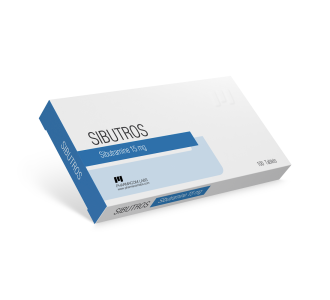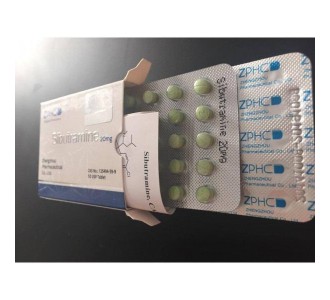Sibutramine
Buy Sibutramine on domestic-supply.com
Sibutramine is a weight-loss medication that works by affecting the chemicals in the brain that control hunger and cravings. It is commonly prescribed for individuals who are overweight or obese and are struggling to lose weight through diet and exercise alone. Sibutramine helps to suppress appetite, making it easier for users to consume fewer calories and stick to a healthy eating plan.
Sibutramine is typically taken once a day and should be used in conjunction with a balanced diet and regular exercise routine. It is important to follow the dosage instructions provided by a healthcare provider to ensure safe and effective use of the medication. While Sibutramine can be a helpful tool for weight loss, it is not a magic solution and should be used in combination with lifestyle changes for long-term success. Prior to starting any new weight-loss medication, it is important to consult with a healthcare professional to determine if Sibutramine is the right choice for you.
FAQs for Sibutramine:
-
What is Sibutramine used for? Sibutramine was used as a long-term appetite suppressant and weight loss medication. It was prescribed to aid weight loss in conjunction with a low-calorie diet and physical activity, particularly in individuals who were overweight or obese and had other health risk factors like diabetes, high cholesterol, or high blood pressure. However, it's important to note that Sibutramine has been withdrawn from the market in many countries due to safety concerns.
-
Does Sibutramine have any side effects? Yes, Sibutramine has been associated with several side effects, which contributed to its withdrawal from the market. Common side effects included dry mouth, headache, difficulty sleeping, and constipation. More severe side effects that led to its withdrawal are increased blood pressure, increased heart rate, heart attack, stroke, and mental health issues such as mood changes. Its use was also linked to the risk of developing Serotonin Syndrome, a potentially life-threatening condition.
-
How does Sibutramine work in the body? Sibutramine worked by affecting neurotransmitters in the brain. It inhibited the reuptake of serotonin, norepinephrine, and dopamine to a lesser extent, which are chemicals that influence mood and appetite. The inhibition of these neurotransmitters' reuptake in the brain helped to increase the feeling of fullness and reduce appetite, leading to a decrease in food intake.
-
Is Sibutramine recommended for weight loss? While Sibutramine was initially prescribed for weight loss, due to the risks associated with its use, including cardiovascular events and stroke, it has been withdrawn from the market in many countries, including the United States, Canada, the UK, and the European Union. Therefore, it is no longer recommended or available as a weight loss medication.
-
Are there any interactions with other medications when taking Sibutramine? Sibutramine had the potential to interact with a number of other medications, which could lead to serious adverse effects. It was especially important to avoid taking Sibutramine with certain antidepressants, migraine medications, cough, cold, and allergy medications, as well as with other supplements or medications that could affect serotonin levels due to the increased risk of Serotonin Syndrome. Interactions with other weight loss drugs and medications for heart conditions or blood pressure were also a serious concern. Always disclose all medications and supplements you are taking to your healthcare provider.
Product reviews for Sibutramine
Review 1 by Alex Murphy: Product rating: 4.7
I started using Sibutramine a few weeks ago for weight management, and I'm already seeing positive results. The appetite suppression effects of Sibutramine are noticeable, helping me control my food intake without feeling deprived. I appreciate the boost in energy levels that come with using this product, which has motivated me to be more active. Although I have experienced mild dry mouth as a side effect, the benefits outweigh this. Overall, I'm satisfied with the results so far and would recommend Sibutramine for those looking to kickstart their weight loss journey.
Review 2 by Jessica Tan: Product rating: 4.5
After consulting with my healthcare provider, I decided to give Sibutramine a try to aid in weight loss. The mechanism of action of Sibutramine in suppressing appetite has been effective for me in reducing overeating tendencies. I haven't encountered any major side effects other than occasional headaches, which subside quickly. The convenience of taking Sibutramine once daily makes it easy to incorporate into my routine. I've noticed gradual but steady progress in my weight loss goals since starting this product.
Review 3 by Daniel Richards: Product rating: 4.8
As someone who has struggled with emotional eating, Sibutramine has been a game-changer for me. Its ability to curb cravings and promote satiety has significantly helped me break unhealthy eating habits. I appreciate that Sibutramine works to regulate neurotransmitters in the brain, providing a comprehensive approach to weight management. The initial adjustment period came with some mild gastrointestinal discomfort, but it resolved quickly. Overall, I'm impressed with the effectiveness of Sibutramine and its contribution to my overall well-being.
Review 4 by Olivia Stephenson: Product rating: 4.6
I've been using Sibutramine in combination with a balanced diet and regular exercise, and the results have been remarkable. The energy boost from Sibutramine has been instrumental in keeping me active and motivated throughout the day. While there have been instances of slight dizziness, staying hydrated has helped alleviate this symptom. The convenience of Sibutramine in helping me manage my weight without feeling overly restricted has been a refreshing change. I highly recommend Sibutramine to anyone looking for a reliable weight management solution.
Sibutramine: What is it, its dosage and side effects
What is sibutramine?
Diet pills often promise a miracle in a bottle, but what they sometimes deliver isn't worth the magic. In October, the Food and Drug Administration (FDA) announced that Meridia, which contains the compound sibutramine, has been withdrawn from the U.S. market after a clinical trial revealed an increased risk of heart attack and stroke among those taking the obesity drug.
- Sibutramine was withdrawn from the U.S. market in October 2010.
- Sibutramine affects chemicals in the brain that affect weight maintenance.
- Sibutramine is used together with diet and exercise to treat obesity that may be related to diabetes, high cholesterol, or high blood pressure.
- Sibutramine may also be used for other purposes not listed in this medication guide.
DOSAGE AND ADMINISTRATION
The recommended starting dose of MERIDIA is 10 mg administered once daily with or without food. If there is inadequate weight loss, the dose may be titrated after four weeks to a total of 15 mg once daily. The 5 mg dose should be reserved for patients who do not tolerate the 10 mg dose. Blood pressure and heart rate changes should be taken into account when making decisions regarding dose titration (see WARNINGS and PRECAUTIONS).
Doses above 15 mg daily are not recommended. In most of the clinical trials, MERIDIA was given in the morning.
You should not take this medication if you are allergic to sibutramine, or if you have:
- severe or uncontrolled hypertension (high blood pressure);
- an eating disorder (anorexia or bulimia);
- a history of coronary artery disease (atherosclerosis);
- a history of heart disease (congestive heart failure, heart rhythm disorder);
- a history of heart attack or stroke; or
- if you are taking stimulant diet pills.
Before taking sibutramine:
-
tell your doctor if you have glaucoma, high blood pressure, liver or kidney disease, depression, underactive thyroid, seizures, a bleeding disorder, a history of gallstones, or if you are older than 65 or younger than 16.
- Tell your doctor about all prescription and over-the-counter medications you use, especially antidepressants, cold or allergy medication, narcotic pain medicine, or migraine headache medicines.
- Tell your doctor if you do not lose at least 4 pounds after taking the medication for 4 weeks along with a low calorie diet.
Common side effects of Meridia (sibutramine hydrochloride) include:
- flu symptoms,
- runny or stuffy nose,
- sore throat,
- cough,
- fast or pounding heartbeats,
- high blood pressure,
- new or worsening shortness of breath,
- seizure (convulsions),
- fast or uneven heartbeats,
- dry mouth,
- upset stomach,
- loss of appetite,
- constipation,
- stomach pain,
- headache,
- back pain,
- joint pain,
- nervousness,
- dizziness,
- depression,
- trouble sleeping (insomnia),
- skin rash, and
- warmth, redness, or tingly feeling under your skin.


